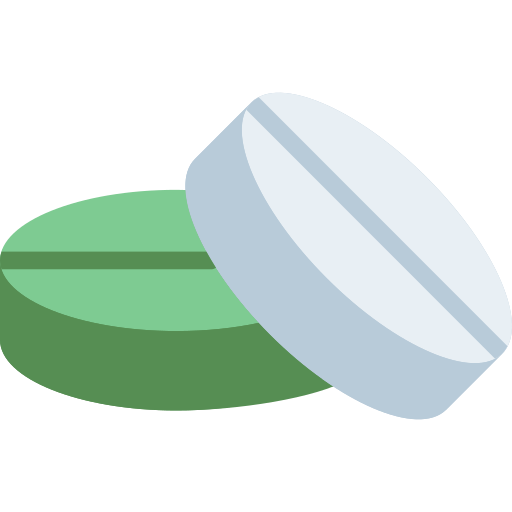
Empagliflozin + Metformin Hydrochloride
5 mg+500 mg
Ziska Pharmaceuticals Ltd.
Product Details
Description
Empagliflozin is an inhibitor of Sodium-Glucose Co-Transporter 2 (SGLT2). SGLT2 is the predominant transporter, responsible for reabsorption of glucose from the kidney back into the circulation. By inhibiting SGLT2, Empagliflozin reduces renal reabsorption of filtered glucose and lowers the renal threshold for glucose and thereby increases urinary glucose excretion. Metformin Hydrochloride is a biguanide type oral antihyperglycemic drug, used in the management of type 2 diabetes. It lowers both basal and postprandial plasma glucose. It does not produce hypoglycemia. Metformin Hydrochloride decreases hepatic glucose production, decreases intestinal absorption of glucose and improves insulin sensitivity by an increase in peripheral glucose uptake and utilization.
This tablet is indicated for the treatment of adults with type 2 diabetes mellitus as an adjunct to diet and exercise: In patients insufficiently controlled on their maximally tolerated dose of Metformin alone In combination with other medicinal products for the treatment of diabetes, in patients insufficiently controlled with Metformin and these medicinal products In patients already being treated with the combination of Empagliflozin and Metformin as separate tablets.
Hypersensitivity to Empagliflozin and Metformin Any type of acute metabolic acidosis (such as lactic acidosis, diabetic ketoacidosis) Diabetic pre-coma Severe renal failure (GFR <30 ml/min) Acute conditions with the potential to alter renal function such as: dehydration, severe infection, shock Disease which may cause tissue hypoxia (especially acute disease, or worsening of chronic disease) such as: decompensated heart failure, respiratory failure, recent myocardial infarction, shock Hepatic impairment, acute alcohol intoxication, alcoholism
Most common adverse reactions associated with Empagliflozin (5% or greater incidence) were urinary tract infection and female genital mycotic infections. Most common adverse reactions associated with Metformin (>5%) are diarrhea, nausea/vomiting, flatulence, abdominal discomfort, indigestion, asthenia, and headache. The following important adverse reactions are given below: Very common: Hypoglycemia (when used with sulphonylurea or insulin), Gastrointestinal symptoms Common: Vaginal moniliasis, vulvovaginitis, balanitis and other genital infection. Urinary tract infection (including pyelonephritis and urosepsis), thirst, taste disturbance, pruritus (generalised), rash, Increased urination, serum lipids increased Uncommon: Volume depletion, urticaria, dysuria, blood creatinine increased/Glomerular filtration rate decreased, Haematocrit increased Rare: Diabetic ketoacidosis.
Advise females of the potential risk to a fetus especially during the second and third trimesters. This is not recommended when breastfeeding.
Lactic Acidosis: Postmarketing cases of Metformin Hydrochloride-associated lactic acidosis. If lactic acidosis is suspected, general supportive measures should be instituted promptly in a hospital setting, along with immediate discontinuation of this combination. Hypotension: Before initiating this combination assess and correct volume status in patients with renal impairment, the elderly, in patients with low systolic blood pressure, and in patients on diuretics. Monitor for signs and symptoms of hypotension after initiating therapy and increase monitoring in clinical situations where volume contraction is expected. Ketoacidosis: Before initiating this combination assess patients who present with signs and symptoms of metabolic acidosis for ketoacidosis, regardless of blood glucose level. If suspected, discontinue this combination, evaluate and treat promptly. Acute kidney injury & impairment in renal function: Consider temporarily discontinuing this combination in settings of reduced oral intake or fluid losses. If acute kidney injury occurs, discontinue this combination promptly and institute treatment. Urosepsis, Pyelonephritis, Fournier’s gangrene & Genital mycotic infections: Treatment with SGLT2 inhibitors increases the risk for urinary tract infections. Evaluate patients for signs and symptoms of urinary tract infections and treat promptly, if indicated. Hypoglycemia: Consider lowering the dose of insulin secretagogue or insulin to reduce the risk of hypoglycemia when initiating this combination. Vitamin B12 Deficiency: Metformin Hydrochloride may lower vitamin B12 levels. Monitor hematologic parameters annually. Increased LDL-C: Monitor and treat as appropriate. Macrovascular Outcomes: There have been no clinical studies establishing conclusive evidence of macrovascular risk reduction with this combination.
In controlled clinical studies single doses of up to 800 mg Empagliflozin (equivalent to 32-times the highest recommended daily dose) in healthy volunteers and multiple daily doses of up to 100 mg Empagliflozin (equivalent to 4-times the highest recommended daily dose) in patients with type 2 diabetes did not show any toxicity. Hypoglycaemia has not been seen with Metformin doses of up to 85 g, although lactic acidosis has occurred in such circumstances. Lactic acidosis is a medical emergency and must be treated in hospital. In the event of an overdose, treatment should be initiated as appropriate to the patient's clinical status. The most effective method to remove lactate and Metformin is haemodialysis. The removal of Empagliflozin by haemodialysis has not been studied
Combination Oral hypoglycemic preparations
Keep below 30°C temperature, protected from light & moisture. Keep out of the reach of children.
-
Support 24/7
Call us anytime -
100% Safety
Only secure payments